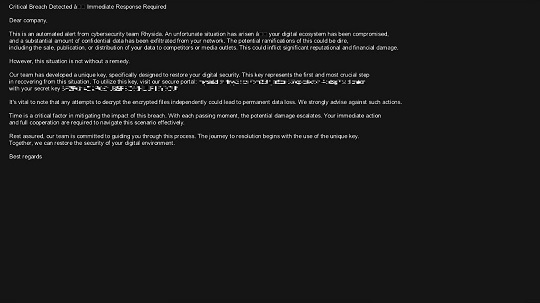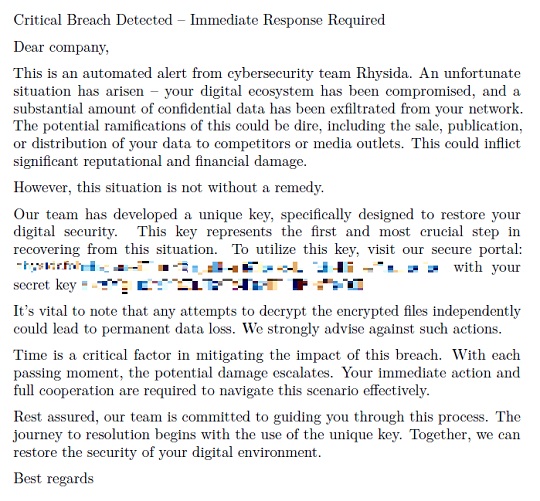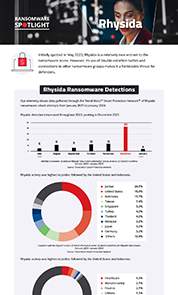Ransom.Win64.RHYSIDA.THEBBBC
Windows


Threat Type: Ransomware
Destructiveness: No
Encrypted: No
In the wild: Yes
OVERVIEW
This Ransomware arrives on a system as a file dropped by other malware or as a file downloaded unknowingly by users when visiting malicious sites.
It drops files as ransom note.
TECHNICAL DETAILS
Arrival Details
This Ransomware arrives on a system as a file dropped by other malware or as a file downloaded unknowingly by users when visiting malicious sites.
Installation
This Ransomware drops the following files:
- %Public%\bg.jpg
(Note: %Public% is the folder that serves as a repository of files or folders common to all users, which is usually C:\Users\Public in Windows Vista, 7, and 8.)
It adds the following processes:
- cmd.exe /c reg delete "HKCU\Conttol Panel\Desktop" /v Wallpaper /f
- cmd.exe /c reg delete "HKCU\Conttol Panel\Desktop" /v WallpaperStyle /f
- cmd.exe /c reg add "HKCU\Software\Microsoft\Windows\CurrentVersion\Policies\ActiveDesktop" /v NoChangingWallPaper /t REG_SZ /d 1 /f
- cmd.exe /c reg add "HKLM\Software\Microsoft\Windows\CurrentVersion\Policies\ActiveDesktop" /v NoChangingWallPaper /t REG_SZ /d 1 /f
- cmd.exe /c reg add "HKCU\Control Panel\Desktop" /v Wallpaper /t REG_SZ /d "%Public%\bg.jpg" /f
- cmd.exe /c reg add "HKLM\Software\Microsoft\Windows\CurrentVersion\Policies\System" /v Wallpaper /t REG_SZ /d "%Public%\bg.jpg" /f
- cmd.exe /c reg add "HKLM\Software\Microsoft\Windows\CurrentVersion\Policies\System" /v WallpaperStyle /t REG_SZ /d 2 /f
- cmd.exe /c reg add "HKCU\Control Panel\Desktop" /v WallpaperStyle /t REG_SZ /d 2 /f
- rundll32.exe user32.dll,UpdatePerUserSystemParameters
- cmd.exe /c start powershell.exe -WindowStyle Hidden -Command Sleep -Milliseconds 500; Remove-Item -Force -Path "{Malware File Path}\{Malware File Name}" -ErrorAction SilentlyContinue; → executed to delete itself after execution
(Note: %Public% is the folder that serves as a repository of files or folders common to all users, which is usually C:\Users\Public in Windows Vista, 7, and 8.)
Other System Modifications
This Ransomware changes the desktop wallpaper by modifying the following registry entries:
HKEY_CURRENT_USER\Software\Microsoft\
Windows\CurrentVersion\Policies\
ActiveDesktop
NoChangingWallPaper = 1
(Note: The default value data of the said registry entry is 0.)
HKEY_LOCAL_MACHINE\Software\Microsoft\
Windows\CurrentVersion\Policies\
ActiveDesktop
NoChangingWallPaper = 1
(Note: The default value data of the said registry entry is 0.)
HKEY_CURRENT_USER\Control Panel\Desktop
Wallpaper = %Public%\bg.jpg
HKEY_LOCAL_MACHINE\Software\Microsoft\
Windows\CurrentVersion\Policies\
System
Wallpaper = %Public%\bg.jpg
HKEY_LOCAL_MACHINE\Software\Microsoft\
Windows\CurrentVersion\Policies\
System
WallpaperStyle = 2
(Note: The default value data of the said registry entry is 0.)
HKEY_CURRENT_USER\Control Panel\Desktop
WallpaperStyle = 2
(Note: The default value data of the said registry entry is 0.)
It sets the system's desktop wallpaper to the following image:
- %Public%\bg.jpg

Other Details
This Ransomware does the following:
- It displays its activity on the console.
- It initializes resources based on the number of processors available in the system.
- It encrypts all system drives from A to Z.
- It deletes itself after execution.
- It displays the following after execution:

It accepts the following parameters:
- -d {path to encrypt} → used to specify directory to encrypt
- -sr → self-remove modifier
Ransomware Routine
This Ransomware avoids encrypting files with the following strings in their file name:
- .bat
- .bin
- .cab
- .cmd
- .com
- .cur
- .diagcab
- .diagcfg
- .diagpkg
- .drv
- .dll
- .exe
- .hlp
- .hta
- .ico
- .lnk
- .msi
- .ocx
- .ps1
- .psm1
- .scr
- .sys
- .ini
- Thumbs.db
- .url
- .iso
- .cab
It avoids encrypting files found in the following folders:
- $Recycle.Bin
- Boot
- Documents and Settings
- PerfLogs
- Program Files
- Program Files (x86)
- ProgramData
- Recovery
- System Volume Information
- Windows
- $RECYCLE.BIN
It appends the following extension to the file name of the encrypted files:
- .rhysida
It drops the following file(s) as ransom note:
- {Encrypted Directory}\CriticalBreachDetected.pdf

SOLUTION
Step 1
Before doing any scans, Windows 7, Windows 8, Windows 8.1, and Windows 10 users must disable System Restore to allow full scanning of their computers.
Step 2
Note that not all files, folders, and registry keys and entries are installed on your computer during this malware's/spyware's/grayware's execution. This may be due to incomplete installation or other operating system conditions. If you do not find the same files/folders/registry information, please proceed to the next step.
Step 3
Restore these modified registry values
Important:Editing the Windows Registry incorrectly can lead to irreversible system malfunction. Please do this only if you know how to or you can seek your system administrator's help. You may also check out this Microsoft article first before modifying your computer's registry.
- In HKEY_CURRENT_USER\Software\Microsoft\Windows\CurrentVersion\Policies\ActiveDesktop
- NoChangingWallPaper = 1
- NoChangingWallPaper = 1
- In HKEY_LOCAL_MACHINE\Software\Microsoft\Windows\CurrentVersion\Policies\ActiveDesktop
- NoChangingWallPaper = 1
- NoChangingWallPaper = 1
- In HKEY_CURRENT_USER\Control Panel\Desktop
- Wallpaper = %Public%\bg.jpg
- Wallpaper = %Public%\bg.jpg
- In HKEY_LOCAL_MACHINE\Software\Microsoft\Windows\CurrentVersion\Policies\System
- Wallpaper = %Public%\bg.jpg
- Wallpaper = %Public%\bg.jpg
- In HKEY_LOCAL_MACHINE\Software\Microsoft\Windows\CurrentVersion\Policies\System
- WallpaperStyle = 2
- WallpaperStyle = 2
- In HKEY_CURRENT_USER\Control Panel\Desktop
- WallpaperStyle = 2
- WallpaperStyle = 2
Step 4
Search and delete this file
- %Public%\bg.jpg
- {Encrypted Directory}\CriticalBreachDetected.pdf
Step 5
Scan your computer with your Trend Micro product to delete files detected as Ransom.Win64.RHYSIDA.THEBBBC. If the detected files have already been cleaned, deleted, or quarantined by your Trend Micro product, no further step is required. You may opt to simply delete the quarantined files. Please check the following Trend Micro Support pages for more information:
Step 6
Reset your Desktop properties
Step 7
Restore encrypted files from backup.
Did this description help? Tell us how we did.



